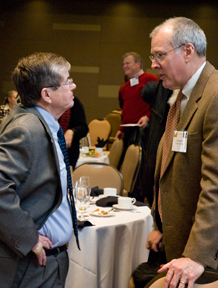Statewide issues concerning what citizens want for Arizona’s future and the state’s progress in developing a bioscience industry were brought into focus in two forums on campus the week of Jan. 11.
Despite a suffering economy, Arizona’s bioscience sector has seen rapid growth in high-paying jobs and firms, according to Walter Plosila of the Battelle Technology Partnership Practice, the nonprofit technology management firm that has been assessing Arizona’s bioscience progress since 2002.
On the down side, Arizona reflected the national trend in fewer federal research grants and venture-capital investments, Plosila told a gathering of university and community members at the High Country Conference Center, which was hosted by the Flinn Foundation.
Arizona’s job growth in the biosciences outpaced the nation—31 percent compared to 12 percent. The average salary of bioscience jobs in Arizona reached $55,749 in 2008. Arizona’s bioscience sector also generates more than $765 million in state and local tax revenues. However, venture capital investments in bioscience firms are down about $49 million from 2008 to 2009.
The state’s budget crisis presents a challenge, Plosila noted, as public investment in research and education programs is threatened.
“NAU has been a leader in science education,” he said, but added, “we need to have money for higher education research.”
Acknowledging the impact of the bioscience industry for Arizona, NAU President John Haeger said, “While it’s kind of grim right now, there is a future for this state and this economy.”
Plosila’s presentation on the bioscience industry is available here.
A day after the Flinn Foundation-sponsored biosciences forum, Lattie Coor, founder of the Center for the Future of Arizona, was on campus to share findings from the Gallup Arizona Poll that Coor said, “reflects what Arizonans are thinking and identifies goals that describe the Arizona we want.”
Coor, a former president of Arizona State University and an NAU alum, described the Center for the Future of Arizona as a “do tank,” as opposed to a “think tank.” The poll was used to create a citizens’ agenda for the future, because, Coor said, “When all is said and done, much more is said than done.”
 Lattie Coor (standing), founder of the Center for the Future of Arizona, leads a panel discussion with (from left) NAU President John Haeger, Flagstaff City Manager Kevin Burke, and J.R. Murray, chair of the Flagstaff Forty and general manager of the Snowbowl. Photo by Jerry Foreman |
The resulting “Arizona We Want” report found that:
- Arizona citizens agree on more than they disagree
on a range of issues. - Arizonans are strongly attached to their communities.
- Citizens view the state’s natural beauty and open spaces as its greatest asset.
- Citizens are not at all satisfied with their
elected leaders. - Arizona residents want jobs.
- Arizona is not a great place for young college
graduates looking to enter the job market.
The report cites the need to graduate high school students who are career- and college-ready and to raise academic standards to national and international standards.
During a panel discussion following Coor’s presentation, Haeger commended the report for its fact-based analysis because, he said, “Much of the debate in Arizona is based on wrongly held beliefs or ideologies.” Haeger added, “We need to find a leadership group to act with courage.”
Additionally, Haeger told the group, “We have to educate people for 21st century jobs. It’s a call to be more thoughtful about (academic) programming.”
“The Arizona We Want” report is available at www.thearizonawewant.org. Visitors to the web site may also take the Gallup Arizona Poll online and compare their responses to those of other citizens.
The forum with Coor was sponsored by the Flagstaff Forty, NAU, city of Flagstaff, Coconino County, Flagstaff Unified School District and Flagstaff Chamber of Commerce.



